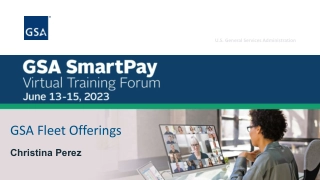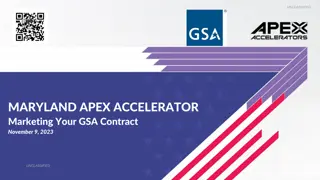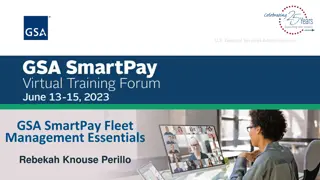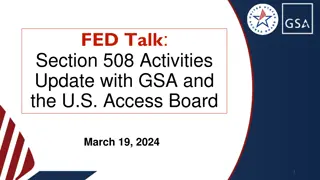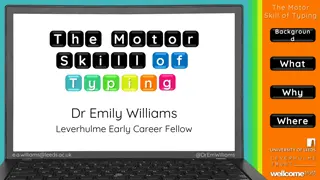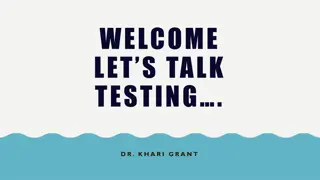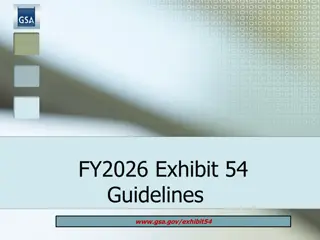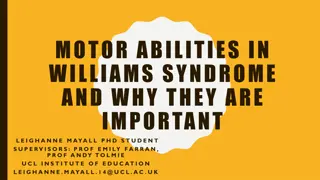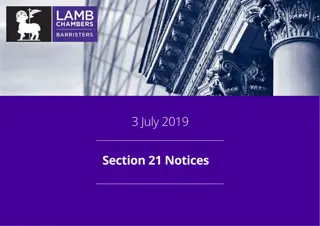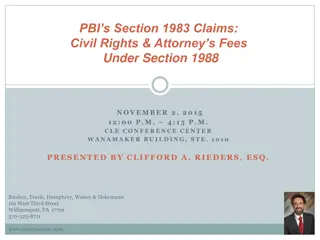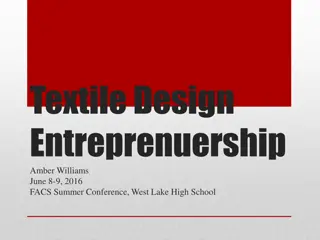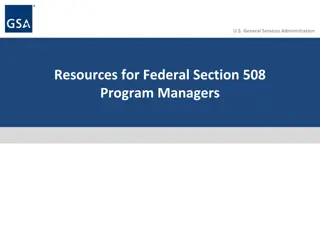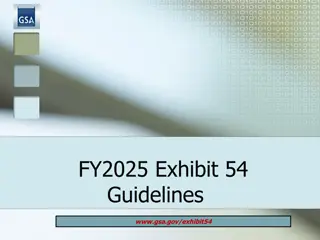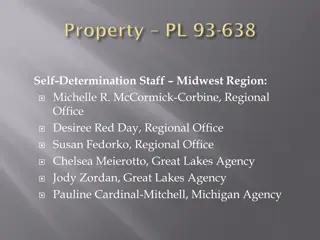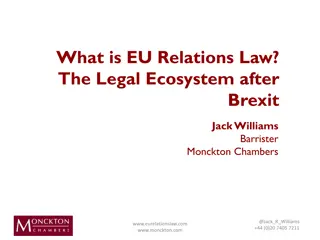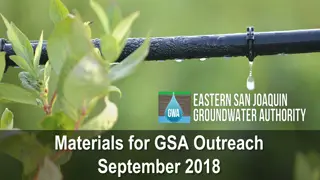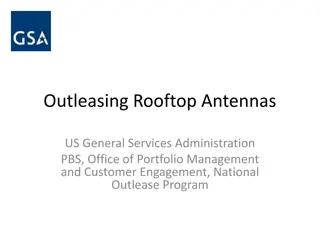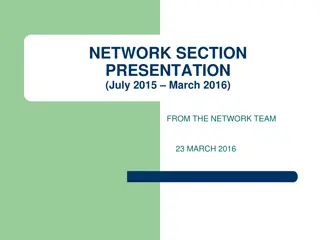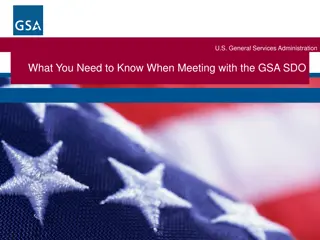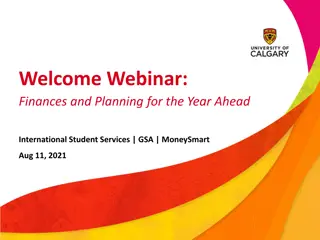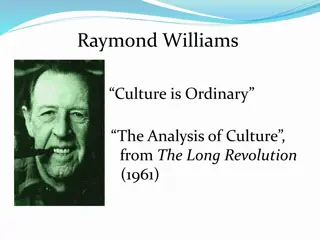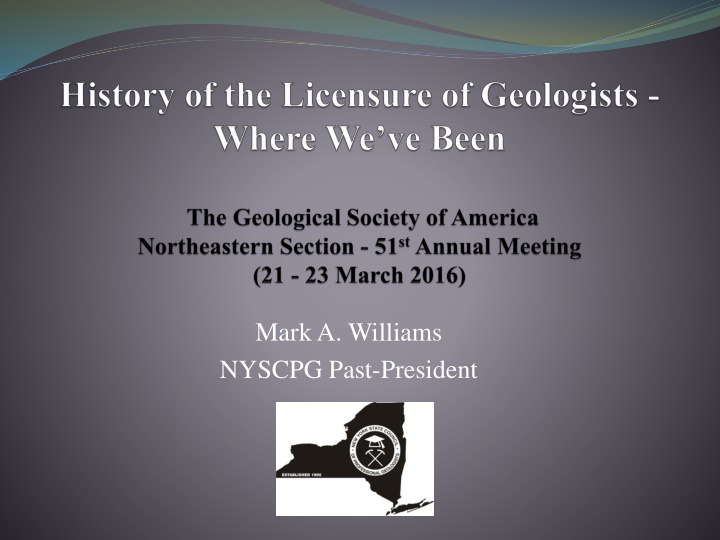
Establishing Licensing for Professional Geologists: Necessity and Impact
This content delves into the importance of licensing for geologists, highlighting the need for a legal framework to ensure qualified, competent, and ethical professional practices. It discusses the reasons behind licensing, myths surrounding licensure, and the role of geologists in protecting the public. Additionally, alternatives to licensure, such as certification and registration, are explored, emphasizing the necessity of rigorous licensure requirements to safeguard the public and uphold professional standards.
Download Presentation

Please find below an Image/Link to download the presentation.
The content on the website is provided AS IS for your information and personal use only. It may not be sold, licensed, or shared on other websites without obtaining consent from the author. If you encounter any issues during the download, it is possible that the publisher has removed the file from their server.
You are allowed to download the files provided on this website for personal or commercial use, subject to the condition that they are used lawfully. All files are the property of their respective owners.
The content on the website is provided AS IS for your information and personal use only. It may not be sold, licensed, or shared on other websites without obtaining consent from the author.
E N D
Presentation Transcript
Mark A. Williams NYSCPG Past-President
Presentation Overview Goal (1995): Establish legal framework for a Qualified, Competent, and Ethical NYS Professional Geologist Why We Need Licensing? Alternatives to Licensure Myths Resulting from Passage of the Licensure Bill Geologist s Role in Protecting the Public Regulations and Policies that require Geologic Expertise How does a Bill Become a Law? The Road from Licensure Bill to Law: A 19 year Effort November 21, 2014: Bill signed into Law Questions 2
Why We Need Licensing? Standing [Title sequestration and practice exclusivity] without licensure, geologists are not considered Professionals Excluded from opportunities because of lack of professional status and the demand for a licensed professional (water supply, mineral resources, environmental permitting, solid and hazardous waste investigation) Rigorous licensure requirements will protect the public from individuals that do not have the requisite qualifications, minimum level of competency, and legal accountability [Qualification Assurance] Assure that practices of geology are performed in an ethical manner that is subject to public scrutiny Licensing program is not perfect but it was critically necessary and our goal - all along - was to establish an acceptable licensing bill to give us theprofessional recognition we need to perform geological services, based on our qualifications, while accommodating the existing engineering licensing rights 3
Alternatives to Licensure CERTIFICATION - Authorized by governmental or non-governmental agency (including private associations and trade groups) to use a specified title Predetermined qualifications / pre-entry review Decertification upon proof of misconduct Individuals still may offer geological services, just not Certified Level of competence may not be uniform in Certification program Education and experience may not meet levels desired by the State of New York REGISTRATION - Law requiring all individuals who wish to engage in a given occupation to register with a designated governmental agency No exams required No predetermined standards of competence (education, experience, legal and ethical responsibilities) LICENSED ENVIRONMENTAL PROFESSIONAL / LICENSED SITE PROFESSIONAL - These programs are limited in scope. While environmental remediation is one of the practice areas of the geological community the practice of Professional Geology encompasses a broader spectrum of services that routinely impact human health and the environment 4
Myths Resulting from Passage of the Licensure Bill Eliminate Jobs - All geologists, currently practicing in NYS, will continue to do so Boost Fees - The market for geological work is mature and highly competitive Establish a Cartel - It is expected that 1,500 to 2,000 licenses will be issued. During the grandfathering period, which is fair and equitable, only eliminates exam requirement not basic education and experience requirements. Mandate more geological work than is currently required - If not needed before passage, will not be needed after passage Displace Other Professions - work currently performed by licensed engineers or other professionals, such as soil scientists, wetland biologists, etc. will not be impacted 5
NYS Policies / Regulations that Require Geologic Expertise NYSDEC DER-10 6 NYCRR Part 420 - 425 : Mining (mined land use plan, prepared by geologist) Part 601 : Recommended Pump Test Procedure for Water Supply Applications (analysis of pumping test data should be carried out by a hydrogeologist) Part 360-11: Hydrogeologic Report Part 375: Geological studies/characterization of site geologic and hydrogeologic conditions to be performed by a Qualified Environmental Professional, which includes a Professional Geologist NYSDOH Soil Vapor Intrusion Guidance recognizes importance of geology and groundwater NYSDOT Materials Method 29 (Geologic Source Report, prepared by a qualified geologist) Design Procedures for Preparing Rock Slope recommendations (GDP-13) Drilling Shaft Inspector s Guideline (GEM-18) Blasting Procedures (GEM-22) 6
Federal Regulations that Require Geologic Expertise 18 CFR 803.43(b) [Susquehanna River Basin Commission requires Professional Geologist to site, test, and permit high capacity water supply wells] 30 CFR - Part 780 [Permitting of Surface Mines requires cross sections, maps and plans to be prepared by qualified individuals, including a Professional Geologist] 30 CFR - Part 784 780 [Permitting of Underground Mines requires cross sections, maps and plans to be prepared by qualified individuals, including a Professional Geologist] 40 CFR - Part 264.90 [Standards for Hazardous Waste Treatment, Storage and Disposal Facilities, qualified geologist required to determine hydrogeologic conditions] 40 CFR - Part 265.90 [Interim Status Standards for Hazardous Waste Treatment, Storage and Disposal Facilities, not subject to groundwater monitoring if qualified geologist determines there is low potential for a release] 40 CFR - Part 312 [Phase 1 ESA, AAI, Environmental Professional ] 43 CFR - Part 2300 [Mineral Resource Analysis for Land Withdrawals] 7
Support for Licensure Environmental Advocates of New York ESWWDA (June 2, 2008) Geological Associations National (AAPG, AIPG, and AEG) NYS Regional (BAPG, CNYPG, HMPGA, and LIAPG) PEF - 93% of all geologists supported bill (2002) NYACE/ACEC - opposition pulled NYSDEC (June 5, 2008), relies on internal and external support of the geologic profession/regulatory agency most impacted by the profession of geology NYSED (March 17, 2008), supports regulating licensed professionals The Business Council of NY 8
How Does a Bill Become a Law? SPONSORS (1 in Senate and 1 in Assembly write the Bill) NYS SENATE - referred to Higher Education Committee - referred to Finance Committee (3 readings) - delivered to NYS Assembly NYS ASSEMBLY - referred to Higher Education Committee - referred to Codes - referred to Ways and Means Committee - sent To Rules Committee - delivered to Assembly Floor - If Floor Vote passes, delivered to Governor NYS GOVERNOR - 10-day Period (Sign or Veto) 9
The Road from Licensure Bill to Law Effort 1995 - 2014 NYSCPG: Presidents (7) NYS Executive: Governors (4) NYS Legislature SENATE: Sponsor (1); Majority Leaders (12); Higher Education Committee Chair (1) ASSEMBLY: Sponsor (1); Speaker (1); Higher Education Committee Chairs (4) Lobbyists (3) Prepare/Submit 60-page White Paper and ten (10) fact sheets /brochures to inform various parties of our opinion 10
The Road from Licensure Bill to Law Effort Early Years (1995 - 2001) NYSCPG educates Members, Sponsors, Committee Members, and builds Support for Licensure Movement 2001 - NYS Senate passes bill 11
The Road from Licensure Bill to Law Effort 2002 - 2005 2002 - Bill passed in Senate, held in Rules (Assembly), holding pen for legislation waiting to be activated for a floor vote 2003 - Bill passed in Senate, held in Higher Education (Assembly) more support now than in past right person at the right time 2004 (Troubling Times, Setback Our Progress) bill passes Senate, Assembly to Floor (no vote); different versions; Higher Ed Chair wants bill to limit practice to small business (50 employees or less or individuals), licensed geologists rather than licensed Professional Geologist, eliminate exemption for government employees, viewed geologists as non- professionals Regulatory standard of competence is established via Brownfields Act in NYS & Federal Superfund Law; EPA defines Environmental Professional, includes professional geologist, AAI 69 CFR 52542 2005 - Bill passed in Senate, receive NYSSPE approval (voice of >25,000 engineers), re- establish positive relationship with Higher Ed Committee (Assembly) 12
The Road from Licensure Bill to Law Effort 2006 - 2009 2006 - Bill passed through Senate, pulled from Higher Ed (Assembly), search for new lobbyist completed, new lobbyist has experience with licensing professions and has access to decision makers in the Assembly long road to reestablish and reeducate central office viewed as major obstacle 6 NYCRR Part 375 regulations approved! AAI officially adopted by USEPA 2007 - Bill passed through Senate, new Chair of Higher Ed (Assembly) appointed, not ready to engage in meaningful negotiations, developed/presented Same As Bill 2008 - Bill passed through Senate, stalled in Higher Ed (Assembly),received Support from ESWWDA, NYSDEC, NYSED, and PEF 2009 - Bill passed through Senate, stalled in Higher Ed (Assembly) Master s requirement and Surveyor s exemptions 13
The Road from Licensure Bill to Law Effort 2010 - 2013 2010 - NYSCPG continues to seek engagement from Assembly Higher Education Committee June to August 2011 - NYSCPG by-laws re-written., formation of Legislative Committee (Membership, Fundraising, and Outreach as well). October 2011 - Peter O Connell hired as lobbyist, begins actively lobbying April 2012 - NYSCPG meets with Assembly Higher Education Committee Chair (Glick) she expresses the desire for a Master s degree and presents the desire of Surveyors to practice geology, similar to Engineers NYS, counties, and Feds require licensed professional geologists for NY projects 2012 to early 2013 - Provide factual response to prove the Bachelor s degree is appropriate base for profession, noting different educational backgrounds between Geologists and Surveyors April 2013 - NYSCPG meets with Higher Ed (Assembly) and come to agreement that Bachelor s degree is preferred, discuss difference between BS and BA. April to May 2013 - NYSCPG provides fact sheets to Higher Ed (Assembly) regarding degrees offered throughout NYS. May 2013 - Bill passes Assembly Higher Ed (Assembly) June 2013 - Bill passes all Assembly Committees, sent to Rules; Senate passes bill at end-of-session 14
The Road from Licensure Bill to Law Effort 2014 February 2014 - Engineers ask for slight language change in bill RE: geological services. They are concerned that exemption language may prevent them from offering all of the services they currently offer. May 2014 - Language agreed to between Engineers, NYSED, and NYSCPG. Bill begins to pass through Committees June 2014 - Bill passes both houses. Sponsor Englebright (NYS Assembly) debates bill on Assembly floor to get it to pass. October 2014 - NYSCPG meets with Governor s office to discuss bill. The land surveyor issue is discussed. NYSCPG provides office with educational and experience difference between professions. 15
Law Governor Andrew Cuomo signed bill into law to establish the profession of geology in New York State on November 21, 2014. The signing of the bill into law was recorded as Chapter #475, with Approval Memo #10. The Governor's memorandum approving the law references Chapter Amendments that were needed to correct a few minor technical errors. The amendments were shared with the NYSCPG's Legislative Sponsors for their approval prior to implementation. March 2015 - Chapter Amendments pass and signed by Governor allowing appointment of geologist to Licensing Board. Three (3) Geologists added to Licensing Board (March 17, 2015) 16
Thank You for Attending Questions? 17

